How much does it cost to rent an RV? Let’s explore the different factors that determine RV rental prices.
An RV, or recreational vehicle, is a popular way to travel. Many people choose to rent an RV rather than buy one. So if you’re trying to decide if you want to rent a RV for your adventure. But have no idea what the cost is to rent one.
You might be wondering just how much does it costs to rent an RV?
The average RV rental per day cost between $75 to $350 depending on the type, size, age, and where you rent the RV from. Renting an older Class A motorhome might cost between $175 to $275, while a small small trailers and campervans $75 to $100 a night. Most luxury RV rental could cost around $275 to $425 a night.
So, the answer to this question can vary depending on the type of RV you are interested in and where you want to go.
Before you go googling, how much does it cost to rent an RV, stop! We’ve got you covered. If you’ve ever wondered about RV rental prices, and whether they can meet your budget, stick around.
In this article, we’ll take an in-depth look at all the average RV rental prices you can expect. We’ll also explore some of the potential hidden costs, and ways you can save money on your next RV rental.
In General, How Much Does It Cost To Rent An RV?
The size and age of the RV will strongly influence the rental price. Also keep in mind that the price does not include fuel, or campground rental which can add up. Especially on a long trip.
However here is a breakdown of the average RV rental prices you can expect.
- A Class A motorhome (10+ years or older): ranges between $175 to $275 per night.
- A newer Class A motorhome: ranges between $350 to $450 per night.
- A Class B motorhome (10+ years or older): ranges between $100 to $200 per night.
- A newer Class B motorhome: ranges between $200 to $350 per night.
- A Class C motorhome (10+ years or older): ranges between $150 to $200 per night
- A newer Class C motorhome: ranges between $225 $400 per night.
- A Travel Trailer (10+ years or older): can cost as little as $50 to $125 per night
- A newer travel trailer: ranges between $125 to as much as $200 per night
- A Fifth Wheel trailer (10+ years or older): ranges between $60 to $150 per night.
- A newer fifth wheel: ranges between $150 to $300 per night.
- A Popup Camper: ranges from $50 to $100 a night
- A Toy Hauler: ranges from $100 to $200 a night
Average RV Rental Prices In 2023
Here are a few examples of some of the more popular RV you can rent and the average rental prices you might expect to pay per night.
| Types Of RV | Average Rental Prices |
|---|---|
| Class A RV | $175 to $350 per night |
| Class B Motorhome | $100 to $225 per night |
| Class C Motorhome | $125 to $250 per night |
| Fifth Wheel Camper | $150 to $250 per night |
| Travel Trailer | $75 to $150 per night |
| Pop Up Camper | $75 to $100 per night |
| Campervan | $100 to $200 per night |
| Toy Hauler | $99 to $180 per night |
| Truck Camper | $100 to $250 per night |
Average RV Rental Prices In Outdoorsy
Outdoorsy is a community-driven RV marketplace that facilitates peer to peer RV rentals directly from RV owners.
This differs from other traditional rental companies who maintain a large fleet, with significant overhead costs, which influences the rental price.
While there are other similar services, Outdoorsy is seen as the largest and safest.
It is a great opportunity for the RV owners to make some extra money when they aren’t using their RV, while also allowing vacationers the opportunity to use a well-maintained RV without having to shoulder the cost of buying one outright.
Since there aren’t any traditional overhead costs, many RV rented through Outdoorsy are more affordable, than similar units at a traditional rental company.
However, selection might be limited by region depending on where you are or where you want to go. With Outdoorsy newer RV’s don’t drive up the prices as much as you find with traditional rental companies.
Here Is A Breakdown Of The Average RV Rental Costs Through Outdoorsy.
- A Class A motorhome: ranges from $175 to $275 a night.
- A Class B motorhome: ranges from $100 to $200 a night.
- A Class C motorhome: ranges from $150 to $200 a night.
- A Travel Trailer: ranges from $50 to $125 a night.
- A Fifth Wheel: ranges from $60 to $150 a night.
- A Popup Camper: ranges from $50 to $100 a night.
- A Toy Hauler: ranges from $100 to $200 a night.
Note: It’s also worth noting that some RV owners will offer discounted “Weekly Rates.”
RVshare is another popular peer to peer RV rental company that connects RV owners with aspiring travelers.
Just like Outdoorsy, they tend to help you find better prices. This is a nice fall back option if you can’t find the type of RV you want within a reasonable distance of where you are or where you want to go.
Here Is A Breakdown Of The Average RV Rental Costs Through RVshare
- Class A: $150-$250/night (10+ years or older); $350-$450/night (newer)
- Class B: $100-$200/night (10+ years or older); $200-$350/night (newer)
- Class C: $100-$200/night (10+ years or older); $225-$400/night (newer)
- Travel Trailer: $50-$125/night (10+ years or older); $125-$200/night (newer)
- Fifth Wheel: $60-$150/night (10+ years or older); $150-$300/night (newer)
Price Averages Data Courtesy of RVshare.com
Just like Outdoorsy, there might be weekly rates available through certain RV owners.
Average RV Rental Prices In Apollo RV
Apollo RV is a large-scale RV rental company with international ties. They have members in the United States as well as the USA, Canada, Australia, and New Zealand as well as parts of Europe.
This makes them an interesting option if you want to travel abroad, yet still enjoy the classic RV experience.
Some of their franchise operators also offer rental cars that can be towed behind a larger motorhome.
Their prices tend to be very similar to a traditional RV rental company. Yet, they can vary widely depending on the size, and type of RV you are interested in, as well as how long you want to rent it for.
They do, however, have a wide selection, that can also be narrowed down by features. Most of their pricing schedule is broken down by the number of weeks you want to rent the RV.
Other Fees & Prices To Consider While Renting An RV
As I mentioned earlier, there are additional cost to renting an RV that goes beyond the per night or weekly rate.
You will want to factor in the following things when developing a budget for your intended trip.
1: RV Campground Rates
RV campgrounds or RV parks are very popular with many travelers. Most have electricity available, as well as other amenities like showers, bathrooms, and facilities to help maintain your RV.
If you are traveling with a secondary tow car, or you are towing a trailer, an RV park makes a great home base.
Chances are the staff can even dial you in on some of the local flavors.
However, they do cost money on a per night or weekly basis. Some also charge extra to use their power, water or other special facilities.
Prices can vary by location and the size of the RV. On average you can expect to pay between $25 to $80 per night. Which doesn’t include power and water costs.
If you are a little more adventurous you could go it alone in some of the wild places, or even reserve a spot at a “Rustic” campground.
Just keep in mind that there is a difference between “Rustic” and “Primitive.” Depending on where you are in the country, a primitive campground might not have sufficient roads and bridges to accommodate a large RV.
2: Cleaning Fees
If you are going through a peer to peer RV rental, the RV owner might not require or charge a cleaning fee.
This is provided that you do a thorough job of cleaning it yourself before returning it.
However, most traditional RV rental companies will charge you a cleaning fee.
Some hide the amount in the fine print, so if you don’t immediately see it, you should ask about it. The average cost of a cleaning fee typically ranges between $50 to $100.
3: Setup/Delivery Fees
There are some RV owners in peer to peer organizations who will give you the option of having your RV rental delivered to a specific campground or RV site.
Depending on the schedule and the type of RV they might even set it up for you.
This arrangement can be handy if you want to use the RV as a home base.
Then you simply drive your normal vehicle to the site. It’s also nice if you don’t have a lot of experience with setting up trailers, connecting power and water systems, or other technical aspects of an RV.
Of course, just like any service, there is a fee. Most peer to peer RV setup and delivery fees range around $150 to $200.
4: Fuel Costs
Motorhomes and campers tend to be big heavy things. That means they tend to have a relatively poor MPG, or they take a big bite out of fuel efficiency of their tow vehicle.
It’s also worth bearing in mind that most rental companies and peer to peer RV rentals require you to fill up the tank when you return it. Some include an additional fee if you don’t fill the tank.
Of course, the amount of fuel you use depends on how far you’ll be driving. The average cost of gas or diesel per gallon is also a factor.
5: Mileage Or Price Per Mile Charges
There are some RV rental companies that offer unlimited miles, at a premium fee, or they provide a mileage allowance.
Once you go over that number of miles, they start charging you a flat rate per mile. This typically averages between $0.25 to $0.75 per mile over the allowance.
6: Taxes
Just like most purchases and services, there are taxes assessed. This is based on the state you are renting the RV from and not necessarily the state you are in or traveling through.
If you are in Minnesota and you are renting an RV across the border in Wisconsin, you will end up paying Wisconsin state taxes.
7: RV Rental Insurance
Rental insurance is one of those things that you might not think you need, right up until the moment you actually do need it.
Some peer to peer RV rental organizations like Outdoorsy offer RV renters up to $1 million in insurance, which also includes roadside assistance, all for free.
Yet, there are some RV rental companies that sell insurance and roadside assistance as an additional extra. If you don’t see it in the fine print, be sure to ask about it!
In some cases, you can also purchase Trip Insurance or Damage Protection which typically costs an extra 6.5 to 7% of your total RV rental cost.
A trip insurance policy allows you to get your money back in the case of an emergency cancellation.
A Damage Protection plan essentially protects you from paying for accidental damage to things like appliances, damaged interiors, burned-out lighting fixtures, or a compromised power converter.
This type of policy is highly recommended if you are thinking about renting a luxury RV!
How Much Does It Cost To Rent An RV For A Week Trip
This is a lot of information to digest and chances are if you try to break all the numbers down into one big equation, you’ll have a flashback to high school algebra class.
The amount can vary depending on the size, and type of RV, as well as how far and how long you plan to travel.
- The cost for a day trip can range from $75 to $350 before tax.
- A 7-day trip can range from $500 to $2,400 before tax.
- A one-month vacation can range from $1,750 to $10,000 before tax.
What Are The Most Popular RV Rentals?
The term RV really describes a wide range of vehicles and campers. The one that’s right for you will depend on where you want to go and what you want to do.
Motorhome
As the name implies a motorhome is a portable residence that is integrated with the travel vehicle.
Some of them are small scale and feel very much like a camper that doesn’t need a separate tow vehicle.
There are different classes of motorhome, which define their size, and weight. In some states, you might need a special driver’s license endorsement to drive a larger motorhome.
Class A Motorhome
This is the largest class of motorhome. Most weighing in excess of 26,000 pounds. They offer most of the comforts of home while you are on the road.
Just a step below a motorcoach bus in size, they tend to take a while to get used to driving.
There are some states that require you to earn a special driver’s license endorsement to legally operate a Class A motorhome on their roads.
Some Class A motorhomes are a little basic. However, most come loaded with amenities. This includes things like a bathroom, full kitchen, and several beds.
In this class, you will also find so-called “Luxury motorhomes, with lavish features. Some of these even have hot tubs and private bedrooms.
Class A motorhomes with one or two extending sides are very popular with luxury RV campers.
They compress nicely for when you want to travel, yet have the ability to expand into a large living accommodation when you park for the evening.
Class A motorhomes are available with gas or diesel engines. Gasoline-powered motorhomes tend to cost a little less, and many RV rental companies will rent them for a little less than a diesel. While diesel motorhomes do cost a little bit more, they are also more fuel-efficient and have a reputation for durability.
Many people who rent a Class A motorhome choose to tow a boat, motorcycle, or even a secondary vehicle like their personal car.
In a case like this, you might want to give preference to a diesel motorhome, for the extra torque and fuel efficiency.
Class B Motorhome
Typically weighing less than 26,000 pounds, most states do not require a special license endorsement to operate a Class B motorhome.
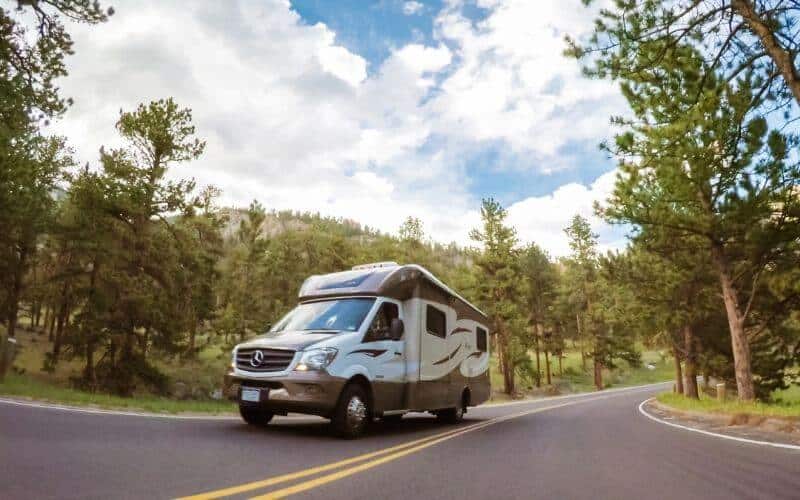
Some Class B motorhomes are little more than elevated full-size vans, while others are a traveling living accommodation. They tend to be a popular option for small families.
More luxurious Class B motorhomes have kitchenettes, pull out beds, and a rudimentary bathroom. Most have innovative storage solutions to make the most out of the available space.
Class B motorhomes tend to be gasoline-powered, but there are a few diesel varieties on the market.
Larger units have more than enough power to tow a boat or a small trailer.
Class C Motorhome
Class C motorhomes are the smallest in the line. While some of them are a little basic, there are some luxury models.
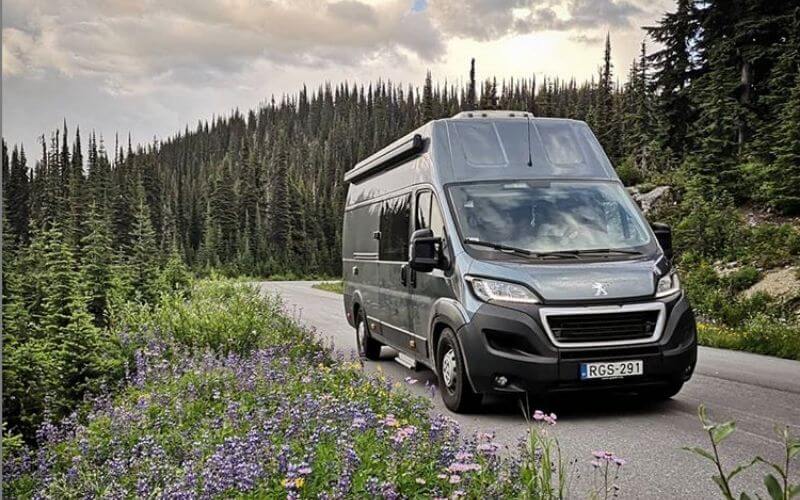
Most weight 10,000 pounds or less, which means most states don’t require a special license endorsement, so long as you aren’t towing a second vehicle.
While they can be a little simple or sparse on amenities, there are many Class C motorhomes that have a fair touch of luxury.
They tend to be very popular for couples who want to get away and travel.
Travel Trailers
Travel trailers come in all shapes, weights, and sizes. Most are meant to be towed behind a mid-to-full size SUV or a pickup truck.
Depending on the state you are traveling in total length and the total weight of the trailer or tow vehicle combined could influence the type of driver’s license endorsement you need.
In most states, you are not allowed to travel in the trailer while you are on the road. When you get to your RV park or campground the trailer is disconnected, the wheels are chocked, and the trailer is leveled before you can use it properly.
Travel trailers are a great option if you are going camping or you want to tour a popular area with a “Home Base” to return to at the end of the day.
Some travel trailers are designed and equipped with their own generator, while others need to derive power from the electric post at a campground.
Just because they can be towed behind a vehicle, doesn’t mean a travel trailer has to be small.
Sure, there are some 12-foot travel trailers that feel cramped and serve as little more than a place to sleep or play a game of cards on a rainy day.
Yet there are others that are long and luxurious giving you most of what you find in a large motorhome.
Fifth Wheel Trailers
Fifth Wheels tend to be on the large side. Most require a special “Goose Neck” hitch mounted into the bed of a full-size pickup truck.
If you don’t already have a truck that can accommodate this type of hitch, you might also need to factor in the cost of renting the tow vehicle.
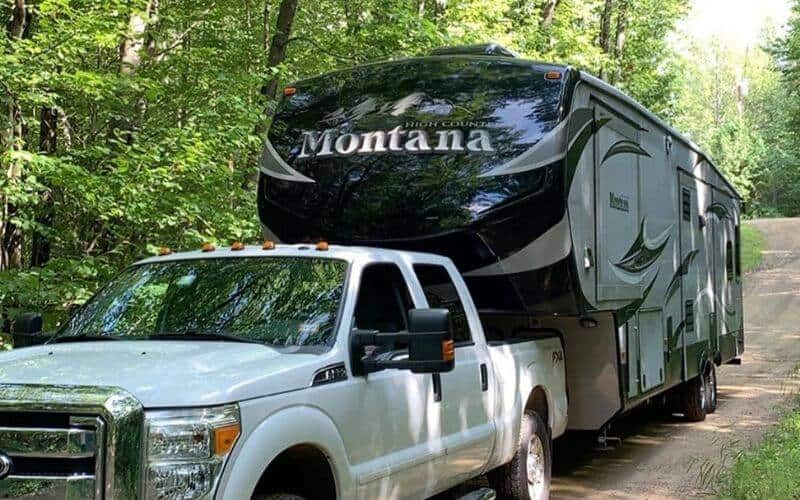
In some states, you need a special driver’s license endorsement if the total weight of the tow vehicle and trailer exceeds 26,000 pounds.
Most feature home-like amenities, and some border on all-out luxury. A fifth wheel is probably as close as you will get to a Class B or even Class A motorhome in terms of available space and amenities.
Just like a travel trailer, you can’t ride in the trailer when you are on the road. You have to set it up at a campground to use to as a home base.
Toy Haulers
This special type of travel trailer is perfect for outdoor sports enthusiasts who want to take their toys with them when they travel.
Unless they are heavily loaded, or extremely long, most toy haulers don’t require a special driver’s license endorsement.
With a toy hauler, you load up an ATV, UTV, motorcycle, or other small vehicles into the back of the trailer via a large access door.
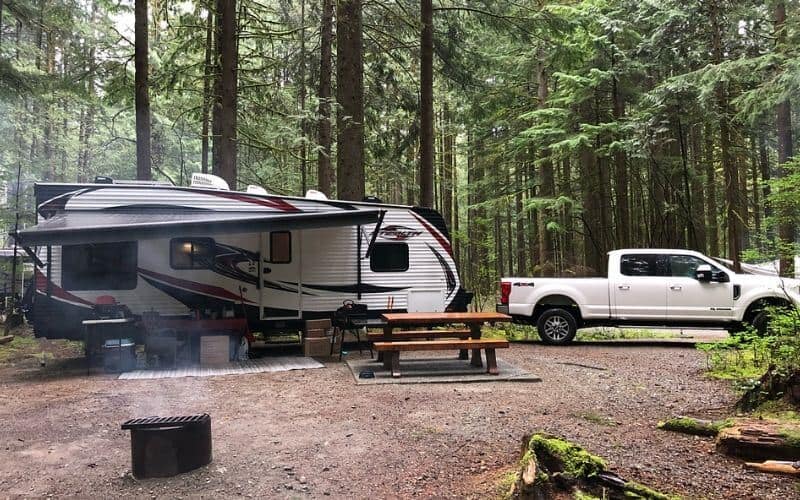
With some toy haulers, the door folds down which also doubles as a loading ramp. Most have a side passage door for accessing the interior of the trailer.
Once the “Toys” have been removed, the cargo area can then be used as living accommodation.
While some are sparse and have little more than a few foldout bunks and basic lights, there are others with nearly all the amenities of a Class B motorhome.
A smaller toy hauler can usually be towed by a mid or full-size SUV. Larger toy haulers require a full-size pickup truck, which you might also need to factor into the cost.
Popup Campers
A popup camper is very lightweight and easy to tow. Many can be towed behind a full-size car.
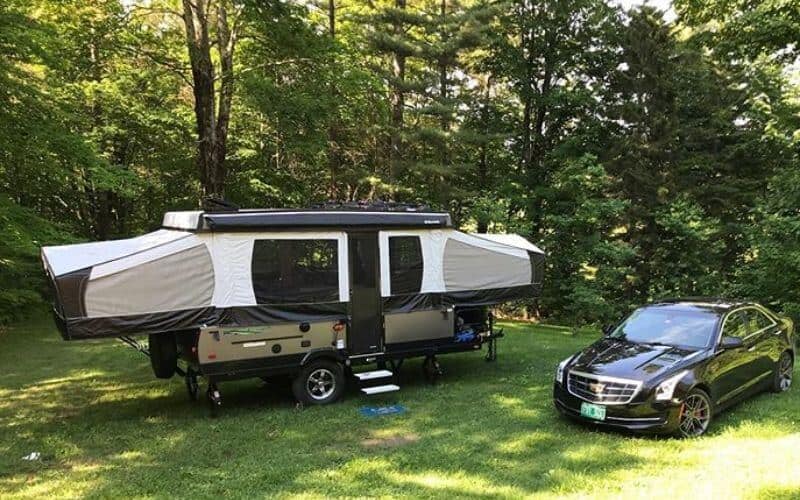
However, a larger popup camper can cause trailer sway for an underpowered car. Especially, on a windy day.
When you get to where you are going, you simply unhitch the camper, lift it up and fold the sides out.
Some of the more high-quality popups come with heating and cooling features that can be run by a generator or plugged into an electric post.
Some of the more basic models, feel like little more than a large tent with a small kitchenette in the middle.
Truck Camper
As the name implies a truck camper is a small camper that fits snugly into the box of a full-size pickup truck. Most have an interior bed that sits above the cab of the truck.
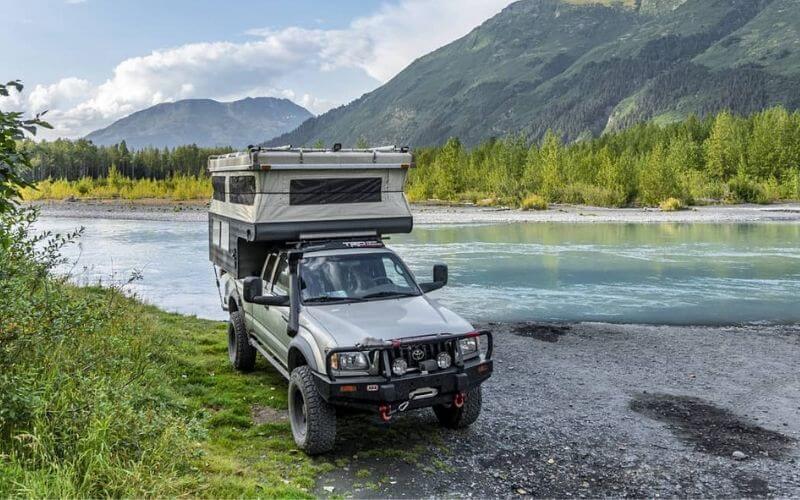
Some of the more high-end units have extending sides to give you more living space when you are parked-up for the night.
Just like trailers, you can’t legally ride inside the truck camper while driving. They aren’t heavy enough to require a special license endorsement.
However, it’s still a good idea to gas up at truck stops whenever possible. The height of a truck camper can be troublesome for overhead awnings and pump shelters.
7 Easy Ways To Save Money On Your RV Rental
There are a few ways to save money on an RV rental vacation. Some require you to be a little flexible or use extra forethought.
Still, if you know where to look, and tap into some basic tactics, you can save a lot of money off an RV rental trip.
Tip Number 1: Use Peer To Peer Rental Organizations
As you’ve probably guessed earlier, the peer to peer RV rental organizations are the places where you are likely to find the best deals.
However, there are also some special opportunities out there.
Tip Number 2: Look For Relocation Deals
A “Relocation Deal” is definitely something to keep on your radar, if you are looking to save money on an RV camping trip.
This tends to happen more on popular routes with commercial RV rental companies.
It basically means that someone rented the RV for a one-way trip. When they got to their destination, they returned it to another franchise office and then caught a flight back home.
An example of this might be someone who rented a Class B motorhome in San Diego, California, then drove it up the Pacific Coast Highway to Seattle, Washington.
The RV rental company in San Diego will eventually want their RV back.
So, they offer the unit at a discount for someone who wants to retrace the steps back south from Seattle.
Tip Number 3: Stay In Inexpensive Or Rustic Campgrounds
It’s also worth keeping in mind that the campground or RV lot fees can add up in a hurry.
Staying in “Rustic” campgrounds or areas where there is little to no fee, is sure to leave you with money in your pocket.
Tip Number 4: Try Traveling During The Off Season
Most people want to travel during the summer. During the other three seasons, many RV rental companies and peer to peer organizations see a stiff drop off in interest.
Many will reduce their nightly rates and other fees, to keep money flowing in, rather than watching the RV sit there.
Tip Number 5: Plan And Cook Your Own Meals
Going out to eat when you are on the road can be fun. However, it’s also very costly.
If you plan your meals in advance and make the effort to cook for yourself, you can shave down a lot of your travel costs. This savings can then be put toward other fun activities.
Tip Number 6: Book Your Campsite Well In Advance
Some campgrounds and RV parks will offer a discount for people who reserve their spot in advance.
This might require a small deposit, which will then be rolled into your final cost when you arrive.
Tip Number 7: Use GPS And Drive Carefully
RVs and motorhomes are heavy, and often cumbersome things. They get far less miles to the gallon than a standard road car and are more likely to have an accident.
Driving slow and careful will reduce fuel costs and accident risk. Using a GPS will also keep you from getting lost and having to backtrack in a vehicle that can sometimes be challenging to turn around.
Is Renting An RV Cheaper Than A Hotel?
Hotel rental companies and travel agencies keep coming up with innovative ways for you to find last second deals.
Yet with most of these, it’s a matter of luck to find a great rate at the right place and time. Unless all the stars align and you have a quick trigger finger, chances are staying in an RV will be cheaper than staying in a hotel room.
How Much Does It Cost To Rent A Luxury RV?
Luxury RVs and “Glamping” (Glamour Camping) continues to grow in popularity. This luxury RV’s come with most of the bells and whistles you will find in a five-star hotel, and then some!
They also tend to come with a hefty price tag.
The cost can vary from one unit to the next depending on the size and amenities. Some peer to peer RV owners will require you to have a special driver’s license endorsement to drive it. Most require additional insurance.
- In general, a Class A or Class B Luxury RV can range between $275 to $425 a night.
- A Class C Luxury RV might run more in the neighborhood of $200 to $300 a night.
- With a luxury fifth wheel, you should expect to see something in the range of $250 to $400 a night.
All those numbers don’t include things like electricity cost, generator use or water. So, be sure to do your homework before signing on the dotted line.

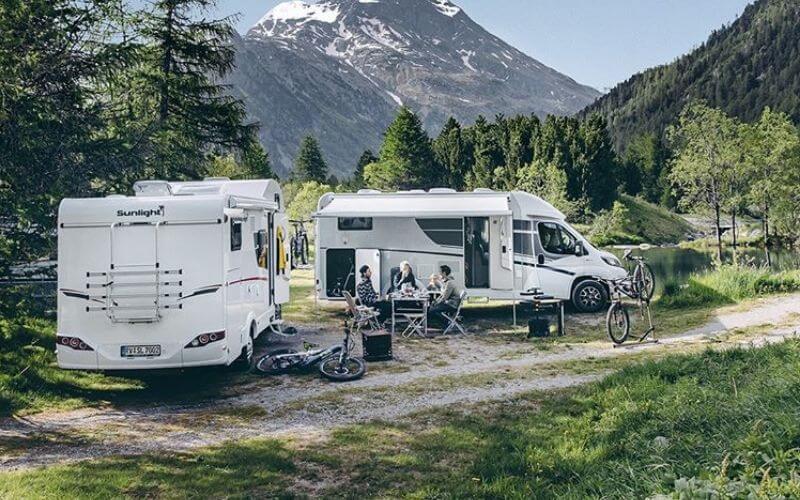



![8 Best SUVs for Towing Travel Trailer in [currentyear]: Top Rated SUV for Towing 5 Best SUVs For Towing A Travel Trailer](https://www.rvingknowhow.com/wp-content/uploads/2020/05/Best-SUVs-For-Towing-A-Travel-Trailer.jpg)
